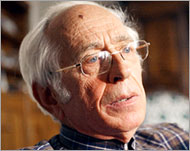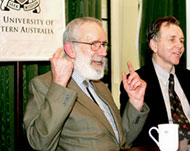French, US pair get chemistry Nobel
France’s Yves Chauvin and Americans Robert Grubbs and Richard Schrock have won the 2005 Nobel Prize in chemistry for their discoveries that helped industry produce drugs and plastics more efficiently and with less hazardous waste.

The trio won the award for their development of the metathesis method in organic synthesis – a way to rearrange groups of atoms within molecules that the Royal Swedish Academy of Sciences likened to a dance in which couples change partners.
The process is used daily in the chemical, biotechnology and food industries to make stronger plastics, better drugs and improved food preservatives.
Green chemistry
“This represents a great step forward for ‘green chemistry,’ reducing potentially hazardous waste through smarter production. Metathesis is an example of how important basic science has been applied for the benefit of man, society and the environment,” the Nobel Prize committee said on Wednesday.
|
“This represents a great step forward for ‘green chemistry,’ reducing potentially hazardous waste through smarter production” Nobel Prize committee |
Chauvin, 74, is the honorary director of research at the Institut Francais du Petrole in Rueil-Malmaison, near Paris.
Grubbs, 63, is a professor of chemistry at the California Institute of Technology, and Schrock is a chemistry professor at the Massachusetts Institute of Technology.
“I feel pretty shaken, that means I can’t talk very well. I had just gotten up and was having a little coffee. I felt that it couldn’t possibly be true, but it was,” Schrock told Swedish Radio after receiving the news.
Methathesis catalysts
The three men share the 10 million-kronor ($1.3 million) award, which will be presented on 10 December in the Swedish capital.
 |
|
Yves Chauvin explained how |
In 1971, Chauvin took the lead in the research by explaining how metathesis reactions functioned, and what types of metal compounds acted as catalysts in the reaction.
With the recipe solved, the next step was to develop the actual catalysts.
“Richard Schrock was the first to produce an efficient metal-compound catalyst for metathesis. This was in 1990,” the committee said.
“Two years later Robert Grubbs developed an even better catalyst, stable in air, that has found many applications.”
The prize is the third Nobel announced this week.
Other awards
On Tuesday, Americans John Hall and Roy Glauber and German Theodor Haensch won the 2005 Nobel Prize in physics for their work in advancing the precision of optic technology, which could improve communication worldwide and help spacecraft navigate more accurately to the stars.
 |
|
Nobel Medicine winners: Barry |
The prize was given to the three for their work in applying modern quantum physics to the study of optics – a pursuit that has led to the improvement of lasers, optical clocks, GPS technology and other instruments.
On Monday, Australians Barry Marshall and Robin Warren won the 2005 Nobel Prize in physiology or medicine for proving, partly by accident, that bacteria and not stress was the main cause of painful ulcers of the stomach and intestine.
The award for peace will be announced on Friday in the Norwegian capital, Oslo. The economics prize, the only one not named in Nobel’s will, will be announced on 10 October.
So far, the Swedish Academy, which awards the literature prize, has not set a date for its announcement, meaning the award could be announced next week.